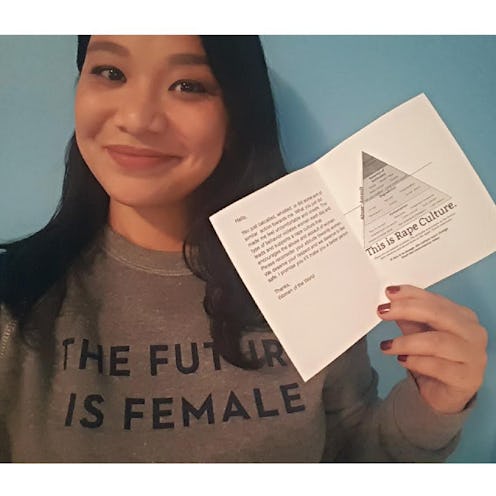
As far as greeting cards go, this one takes the cake: Two women are passing out "This Is Rape Culture" handouts to catcallers in New York City with the goal of informing and educating people about the harmful effects of sexual harassment. "We want to let catcallers know that seemingly insignificant things like catcalling feed into bigger problems like sexual violence," writes Iliana Inocencio in a statement to Bustle. Inocencio and Nicole Pasquale, both actors and comedians based in New York, created the handouts together based on all the things they and their friends have wanted to say when they confront their catcallers.
The handout is foldable, just like a holiday greeting card. On the left side, there's a note especially written for the catcaller, detailing the exact behaviors they just exhibited that support rape culture (e.g. whistling), how it makes many on the receiving end feel (frequently violated and unsafe), and a polite request for a different mindset toward women. It adds, "We deserve your respect and we deserve to feel safe." The handout is signed, "Women of the World."
On the right side of the card is a "rape culture pyramid" that explains the spectrum of sexual violence and the difference between abuse versus assault. Abuse encompasses victimization and degradation (making rape jokes), while full-on assault includes removal of autonomy and explicit violence (groping, incest and sexual coercion), according to the pyramid. "[The pyramid] shows how what some men consider to be an innocent compliment [can] actually be a form of verbal sexual harassment and how it supports rape culture," Pasquale writes.
According to Inocencio, they began giving out the greeting cards at Pasquale's comedy show, "WOKE AF: A Mind-Opening Variety Show," "as a gift to women who can then give them to their catcallers." Soon, more people requested more copies of the "This Is Rape Culture" handout, so Pasquale and Inocencio decided to make it available as a free download online. Pasquale writes that it's a much easier way to handle catcalling besides yelling things like, "*ssh*le!" or saying nothing at all.
For many people, catcalling is often a daily occurrence. Research shows that 85 percent of women in the United States report having been sexually harassed before they're 18 years old, and 77 percent of women report having had men follow them in a way that made them feel unsafe or uncomfortable within the last year. Pasquale writes that she hopes the greeting cards will help catcallers understand the full impact of their actions. "I'm always on guard and worried I'm going to be attacked and raped. That's not because I'm a scared little mouse, but that's because I get catcalled and harassed on such a frequent basis that makes me feel like men don't respect me at all," she writes.
It's worth noting that three out of four encounters of rape are committed by people who already know the survivor as opposed to a complete stranger, according to the Rape, Abuse & Incest National Network (RAINN). That being said, catcalling is often seen as an acceptable form of showing romantic or sexual interest in women and men that should simply be "dealt with," which significantly contributes to a dangerous culture in which those rapes and assaults occur and, again, are seen as something acceptable that survivors should simply move on from. According to RAINN, out of every 1,000 rapes, only seven will lead to a felony conviction; only six convicted rapists will actually go to jail.
Inocencio agrees, writing that catcalling makes women and men feel powerless and infringes on their basic rights to privacy and respect. Now, whenever she encounters a catcaller, she can simply hand over the "This is rape culture" greeting card to get that message across. "When I feel safe, I'll respond verbally, explaining to the cat-caller that their words are rape culture. And they don't get it and freak out at the word, 'rape.' Something on a piece of paper feels more accessible because they can read it and let it sink in," Inocencio writes. "I've passed out at least one everyday since we printed them out. Every catcaller says, 'Thank you,' thinking it's my number or that I'm responding positively to their words. Once I pass out the paper, I don't stay to see their reactions when reading it."
She continues, "I gave [one] to a FedEx employee who was with a big group of guys. I turned around and saw them all huddle around the one guy and read it together. I don't know if they got it, but I felt good it was reaching more than just the catcaller himself. I feel like I am doing my part in taking back the power they tried take away from me when they catcalled me."
Pasquale writes that nobody has catcalled her ever since she's started handing out the greeting cards. "I honestly don't know if we'll change any guy's mind, but at least I did my part to fully express how I and other women feel. If we change one guy's point of view on this, it'll have been worth it," she writes.
View and download the "This Is Rape Culture" handout here.
Images: Courtesy of Iliana Inocencio (2); courtesy of Nicole Pasquale (1)